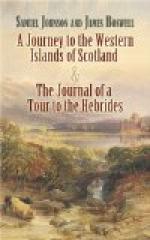The sea was smooth. We never left the shore, and came without any disaster to the cavern, which we found rugged and misshapen, about one hundred and eighty feet long, thirty wide in the broadest part, and in the loftiest, as we guessed, about thirty high. It was now dry, but at high water the sea rises in it near six feet. Here I saw what I had never seen before, limpets and mussels in their natural state. But, as a new testimony to the veracity of common fame, here was no echo to be heard.
We then walked through a natural arch in the rock, which might have pleased us by its novelty, had the stones, which incumbered our feet, given us leisure to consider it. We were shown the gummy seed of the kelp, that fastens itself to a stone, from which it grows into a strong stalk.
In our return, we found a little boy upon the point of rock, catching with his angle, a supper for the family. We rowed up to him, and borrowed his rod, with which Mr. Boswell caught a cuddy.
The cuddy is a fish of which I know not the philosophical name. It is not much bigger than a gudgeon, but is of great use in these Islands, as it affords the lower people both food, and oil for their lamps. Cuddies are so abundant, at sometimes of the year, that they are caught like whitebait in the Thames, only by dipping a basket and drawing it back.
If it were always practicable to fish, these Islands could never be in much danger from famine; but unhappily in the winter, when other provision fails, the seas are commonly too rough for nets, or boats.
TALISKER IN SKY
From Ulinish, our next stage was to Talisker, the house of colonel Macleod, an officer in the Dutch service, who, in this time of universal peace, has for several years been permitted to be absent from his regiment. Having been bred to physick, he is consequently a scholar, and his lady, by accompanying him in his different places of residence, is become skilful in several languages. Talisker is the place beyond all that I have seen, from which the gay and the jovial seem utterly excluded; and where the hermit might expect to grow old in meditation, without possibility of disturbance or interruption. It is situated very near the sea, but upon a coast where no vessel lands but when it is driven by a tempest on the rocks. Towards the land are lofty hills streaming with waterfalls. The garden is sheltered by firs or pines, which grow there so prosperously, that some, which the present inhabitant planted, are very high and thick.
At this place we very happily met Mr. Donald Maclean, a young gentleman, the eldest son of the Laird of Col, heir to a very great extent of land, and so desirous of improving his inheritance, that he spent a considerable time among the farmers of Hertfordshire, and Hampshire, to learn their practice. He worked with his own hands at the principal operations of agriculture, that he might not deceive himself by a false opinion of skill, which, if he should find it deficient at home, he had no means of completing. If the world has agreed to praise the travels and manual labours of the Czar of Muscovy, let Col have his share of the like applause, in the proportion of his dominions to the empire of Russia.




